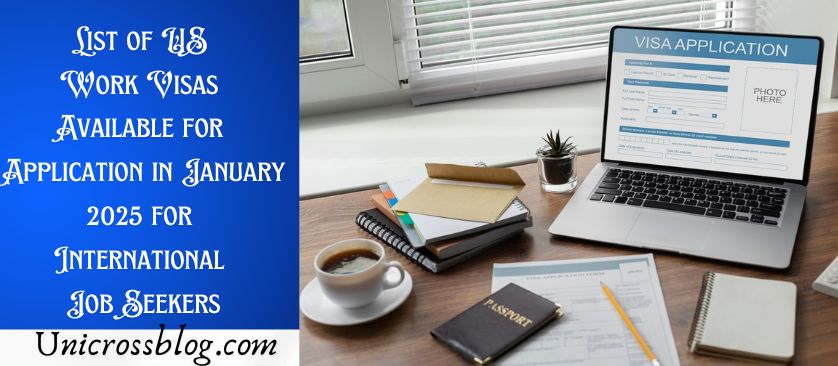US Work Visas: The United States remains one of the top destinations for international job seekers due to its dynamic economy, diverse industries, and opportunities for career growth. For individuals seeking employment in the U.S., securing the right visa is crucial.
As of January 2025, several work visa options are available for foreign nationals interested in working in the U.S. Below is a detailed overview of the primary work visa categories, their eligibility criteria, and important application considerations.

List of US Work Visas Available for Application in January 2025 for International Job Seekers
1. H-1B Visa: Specialty Occupations
The H-1B visa is one of the most well-known and commonly used work visas for foreign professionals. It is designed for individuals who will work in a “specialty occupation,” which typically requires a higher education degree or its equivalent.
Eligibility Criteria:
- Must have at least a bachelor’s degree or its equivalent in a specialized field (e.g., IT, engineering, medicine, etc.).
- The employer must demonstrate that the position requires a specific degree.
- A U.S.-based employer must sponsor the applicant.
Application Process:
- Employers must file an H-1B petition with the U.S. Citizenship and Immigration Services (USCIS).
- The H-1B visa has an annual cap, though certain employers (e.g., higher education institutions) are exempt.
- The application period typically begins in April each year, and the visa is valid for up to three years, extendable to six years.
Important Considerations:
- The H-1B is subject to a lottery system if the number of applications exceeds the cap.
- This visa is only valid if the individual is working for the sponsoring employer.
2. L-1 Visa: Intra-Company Transferee
The L-1 visa is for foreign workers being transferred within a company to a U.S. office. There are two types of L-1 visas: L-1A for executives and managers and L-1B for employees with specialized knowledge.
Eligibility Criteria:
- Applicants must have worked for the company for at least one continuous year within the last three years.
- The U.S. employer must be a branch, affiliate, or subsidiary of the foreign employer.
- L-1A visa holders must be working in an executive or managerial role, while L-1B visa holders must possess specialized knowledge about the company’s products, services, or processes.
Application Process:
- The employer must file a petition with USCIS to initiate the L-1 visa process.
- L-1A visas are valid for up to 7 years, and L-1B visas are valid for up to 5 years.
Important Considerations:
- This visa is ideal for individuals already employed by multinational companies who wish to transfer to the U.S.
- The L-1 visa is not subject to an annual cap.
3. O-1 Visa: Individuals with Extraordinary Ability
The O-1 visa is granted to individuals who demonstrate extraordinary ability or achievement in their field of expertise, including arts, sciences, business, education, and athletics.
Eligibility Criteria:
- Applicants must provide evidence of their extraordinary ability, such as awards, publications, or evidence of original contributions to their field.
- The application must be supported by a U.S. employer or agent, and the work must be in the applicant’s area of expertise.
Application Process:
- The employer or agent must file a petition with USCIS.
- The O-1 visa is typically granted for up to three years, with the possibility of extensions.
Important Considerations:
- O-1 visa holders can bring their dependents (spouses and children under 21) on O-3 visas.
- This visa is ideal for top-tier professionals, including researchers, scientists, and athletes.
4. TN Visa: NAFTA Professionals (Canada and Mexico)
The TN visa is available under the United States-Mexico-Canada Agreement (USMCA), formerly known as NAFTA, for citizens of Canada and Mexico working in certain professional roles.
Eligibility Criteria:
- The applicant must be a citizen of Canada or Mexico.
- The individual must be coming to the U.S. to work in a profession listed under the USMCA, such as engineers, teachers, and accountants.
- A U.S. employer must provide a job offer for the applicant to work in a professional capacity.
Application Process:
- Canadian citizens can apply for the TN visa directly at a U.S. port of entry without the need for prior approval.
- Mexican citizens must apply for a TN visa at a U.S. consulate.
- The TN visa is valid for up to three years and can be renewed indefinitely as long as the individual continues to meet the eligibility requirements.
Important Considerations:
- The TN visa is only available to Canadian and Mexican citizens.
- Unlike other work visas, TN holders do not require employer sponsorship to apply.
5. E-2 Visa: Treaty Investor Visa
The E-2 visa is for individuals from countries that have a treaty of commerce and navigation with the United States. It allows foreign nationals to enter the U.S. to invest in and manage a business.
Eligibility Criteria:
- The applicant must be a citizen of a treaty country.
- The individual must be investing a substantial amount of capital in a U.S. business.
- The applicant must manage or direct the operations of the business.
Application Process:
- The applicant must demonstrate their investment and the nature of the business.
- E-2 visa holders can stay in the U.S. for up to two years, with the possibility of extensions.
Important Considerations:
- This visa is ideal for entrepreneurs and investors from treaty countries.
- E-2 visa holders can bring their spouses and children under 21 to the U.S.
6. H-2A and H-2B Visas: Temporary Agricultural and Non-Agricultural Workers
The H-2A and H-2B visas are for foreign nationals coming to the U.S. for temporary or seasonal work. The H-2A visa is for agricultural workers, while the H-2B visa is for non-agricultural workers in sectors such as hospitality, construction, and landscaping.
Eligibility Criteria:
- The employer must demonstrate that there are not enough U.S. workers willing or able to perform the work.
- The work must be temporary in nature, typically for less than one year.
Application Process:
- Employers must submit a petition to USCIS, along with proof of their need for foreign workers.
- H-2A visas are typically valid for up to one year, while H-2B visas are granted for a period of up to one year with potential extensions.
Important Considerations:
- These visas are employer-specific, and individuals cannot change employers without reapplying.
- There is a cap on the number of H-2B visas issued annually.
7. J-1 Visa: Exchange Visitor Program
The J-1 visa is typically used for individuals participating in an exchange program, including interns, researchers, scholars, and trainees.
Eligibility Criteria:
- The applicant must be participating in an approved exchange program.
- The J-1 visa can be used for various purposes, such as studying, training, or conducting research.
Application Process:
- The sponsoring organization must provide the applicant with a Certificate of Eligibility for Exchange Visitor Status (Form DS-2019).
- The J-1 visa can be issued for a period that corresponds with the exchange program duration, typically up to five years.
Important Considerations:
- Some J-1 visa holders are subject to a two-year home-country physical presence requirement before they can apply for certain other U.S. visas.
- This visa is often used for students, scholars, and cultural exchange participants.
READ ALSO: What Is a Digital Nomad Visa, and How Can You Get One?
FAQs
What is the difference between an H-1B and an L-1 visa?
The H-1B is for foreign professionals working in specialized occupations, while the L-1 is for intra-company transferees who have worked for the same employer outside the U.S. for at least one year.
Can I apply for multiple U.S. work visas?
Yes, it is possible to apply for multiple work visas simultaneously, but each application must meet the specific requirements of the visa category.
Can I switch employers on an H-1B visa?
Yes, you can switch employers while on an H-1B visa, but the new employer must file a new petition with USCIS before you begin working for them.
How long does it take to process a work visa?
Processing times vary depending on the visa type and the workload of the USCIS. Generally, processing can take several months, with some visas requiring additional paperwork or background checks.
Can my family come with me to the U.S. on a work visa?
In most cases, spouses and dependent children under 21 can accompany the visa holder on a dependent visa (e.g., H-4, L-2, O-3).
Conclusion
Navigating the U.S. work visa system can be complex, but understanding the different visa categories and their eligibility criteria is the first step in securing employment in the U.S. Whether you’re a skilled professional, a researcher, or an entrepreneur, there’s likely a visa that suits your circumstances. Be sure to consult with an immigration attorney or expert to ensure that you meet the specific requirements and follow the correct procedures for your application.







